
After two or four years of college, your life can undergo a massive change. One time majoring in business and headed for a career in finance, you may have swapped Wall Street for Broadway after uncovering a love for theater. After traveling abroad for a semester, you could have decided to make an international lifestyle a permanent affair. You most likely made friends you’ll stay in touch with for years to come – at least digitally. You may have also even met the love of your life between freshman orientation and graduation day.
Graduating with an average of over $37,000 in student loan debt, college sweethearts may have to think about postponing those wedding bells or delaying a trip to Fiji. We found that Millennials were more than twice as likely to delay marriage due to the costs associated than any other generation. These delays are understandable considering that the average wedding in the U.S. costs more than $30,000. Finances aside, what are some other reasons for delaying marriage? We surveyed over 1,000 people to find out just that, along with their marriage timelines and if they had ever asked for financial help. Keep reading to see what we learned.
A Quick “I Do”
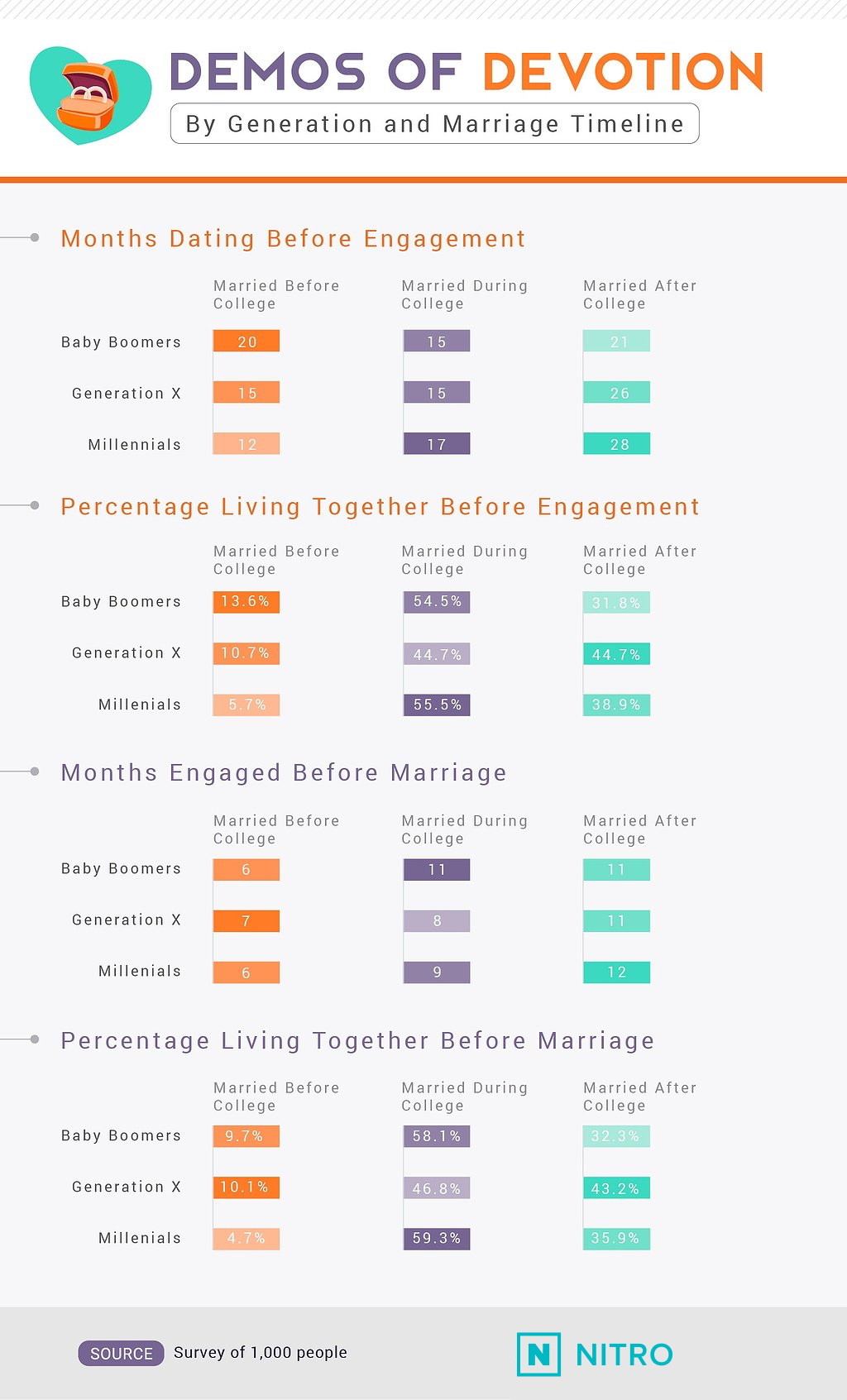
Those waiting to get married until after college tended to bide their time, dating for an average of just over two years (25 months) before popping the question. Millennials led the pack as the slowest to propose across all generations, dating for 28 months on average. On the other hand, millennials who were engaged before college spent the least amount of time in a relationship before proposing with a courtship of exactly a year, on average. It is also worth noting that this group was the least likely to live together before getting engaged.
And while those who tied the knot after college typically waited nearly a year before marriage, people who were married before college couldn’t find the time to postpone their ceremony. Millennials and baby boomers held off for half a year, while Gen Xers were able to be a bit more patient, waiting seven months on average.
Marriage Regret
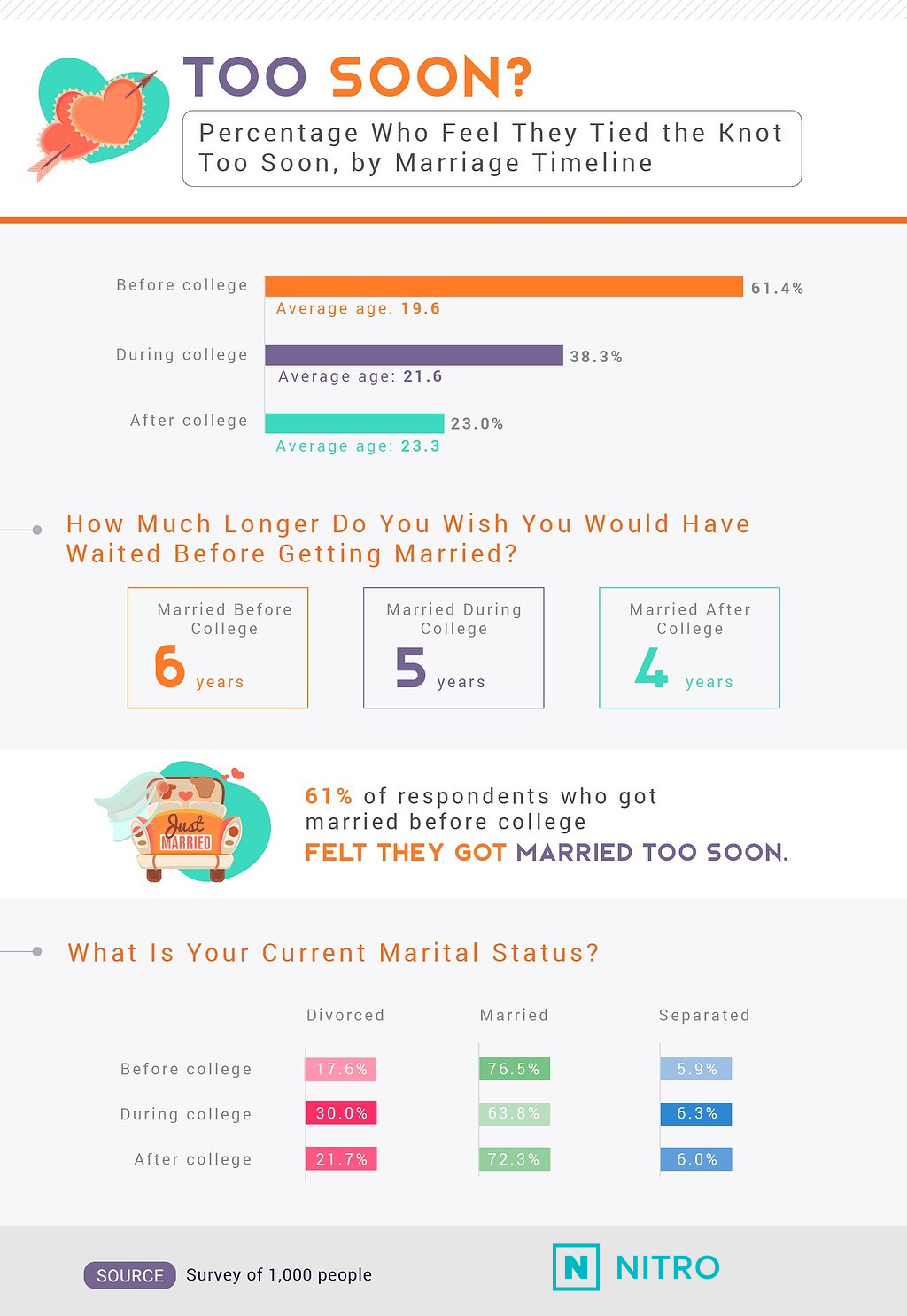
Over 61% of those married before college had buyer’s remorse – they wished they had waited at least six additional years before tying the knot. While the median age for getting married climbed into the late 20s for men and women as of 2015, it was common in the 1950s for women to get hitched just after high school or while enrolled. During this time, women married at an age closer to 20 years old and were stereotypically thought to pursue an “M.R.S.” degree while in college: also known as a husband.
While those who married earliest may have had the largest regret about getting married too soon, there are upsides to consider. This group was the least likely to have been divorced. Those who were married during college saw the highest rate of separation at 30%. Factor in the debt that couples amass for their studies, plus their wedding, and add in a costly divorce – estimated to cost $15,000, on average – and their financial future could look rather bleak. Especially next to the 76% of those married before college who still found themselves together.
Love, Love, Love
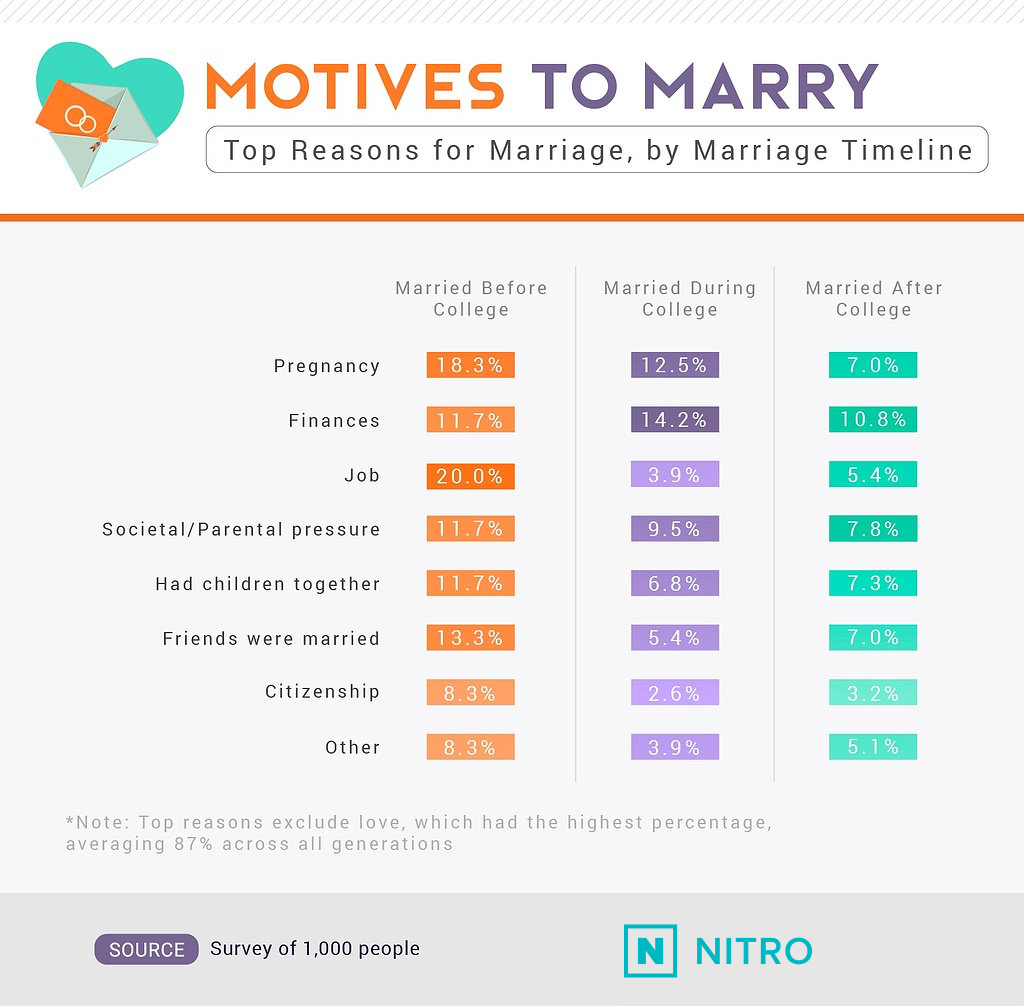
While the axiom “all you need is love” doesn’t account for your landlord or student loan repayment schedule, it is the overwhelming reason people got married before, during, or after college.
With almost 230,000 children born per year to women aged 15 to 19 years old, an unplanned pregnancy can lead some individuals to another unplanned moment in their lives: an early marriage. For those who were married before college, over 18% of the unions were motivated by a pregnancy. This was also a double-digit driver for those married in college. Nearly 13% of those in this group reported pregnancy as a reason for completing their nuptials.
Reasons related to finances, like paying off student loan debt or receiving tax benefits, proved to be the second biggest driver of marriages for those united after their college experience concluded.
Saving the Date
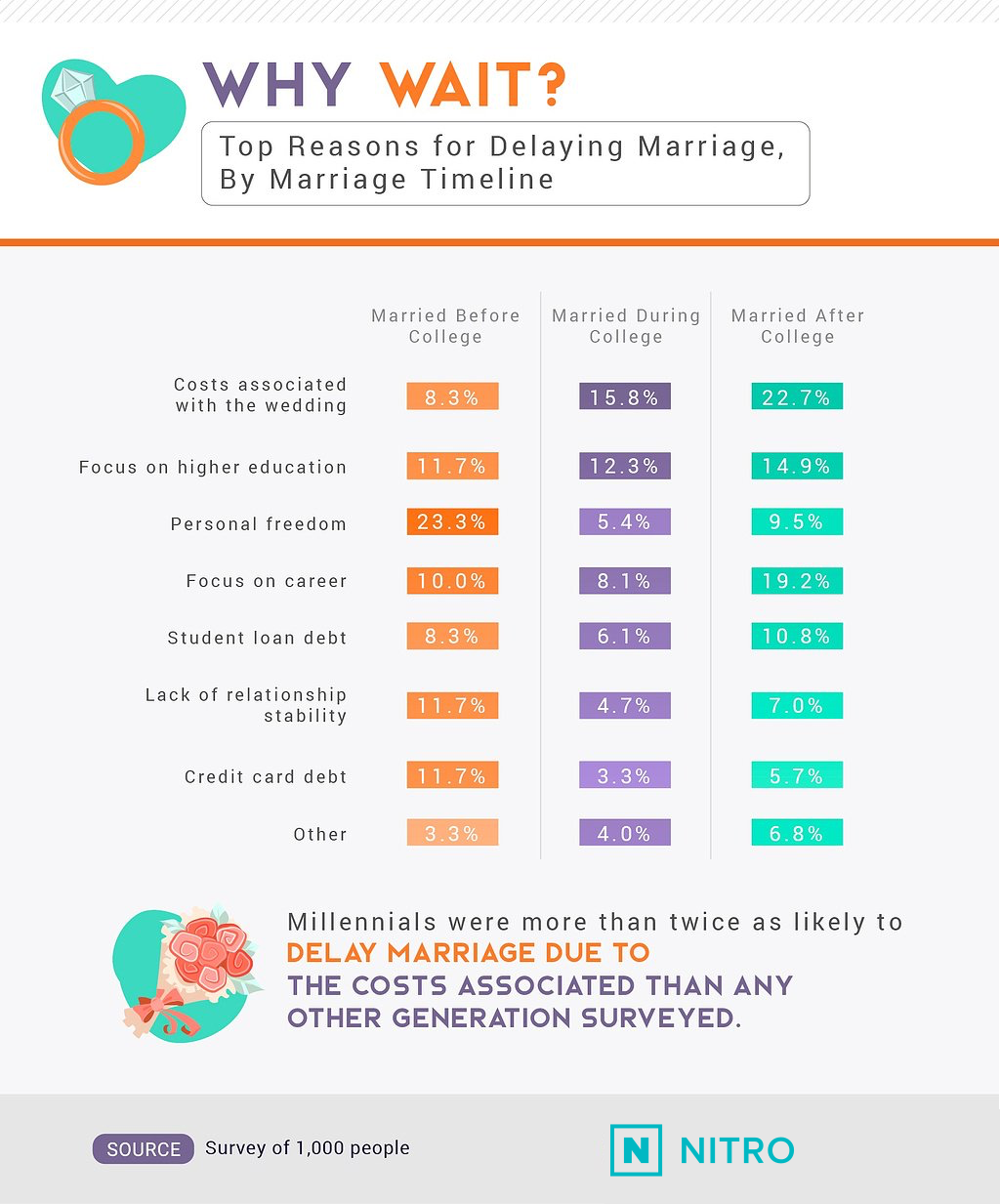
You may not be able to put a price on love, but the sticker shock of a wedding could lead to a delay in scheduling the “big day.” Those married after college were the most likely to postpone the photo booths and put the forks down before sampling those cakes. Nearly 23% of this group listed the cost as their primary reason for placing their wedding on the back burner. Over 10% also called out their student loan debt as a reason for pushing back being lawfully wedded, thanks to monthly payments of almost $400 on average.
The pursuit of additional education, such as a graduate degree or medical school, was another major reason many decided to wait to get married. Considering that the average medical school graduate accrues over $190,000 in student loan debt, it’s possible that the financial burden of their educational pursuits presents too big of an obstacle for walking down the aisle.
Helping Hands
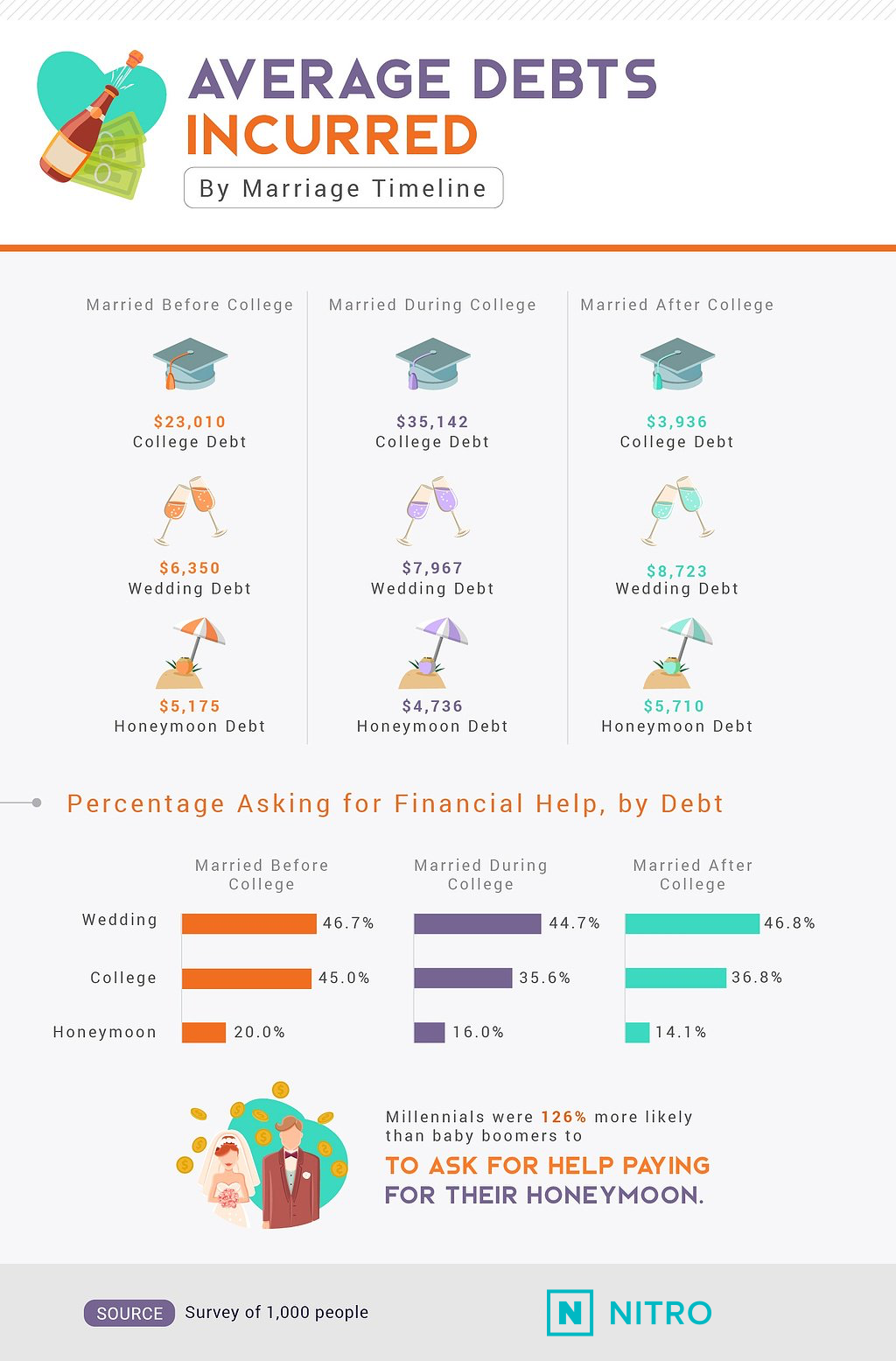
With debts for education averaging $37,172, being mindful of the cost of a wedding and additional debt is prudent. Those who were married after college incurred the largest amount of personal debt related to their wedding at $8,723 on average. This was almost 10% more than those who were married in college ($7,967) and 37% more than those wedded before college ($6,350).
Each of these groups wasn’t shy in asking for aid, though, with no less than 44% asking someone to help offset the costs of the wedding. This could be because parents contribute $19,000 on average, with $12,000 coming from the bride’s side and $7,000 from the groom’s.
The Right Reasons
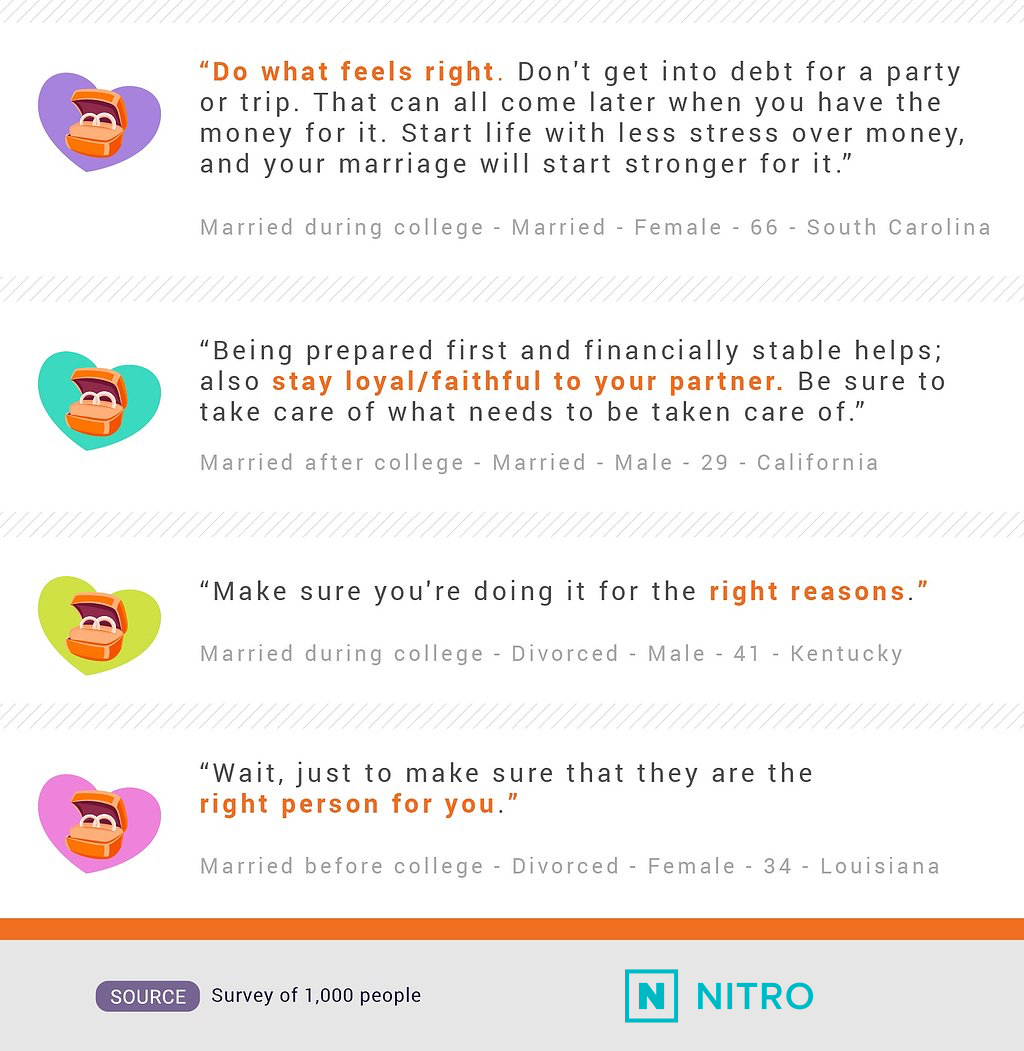
All Paths Are Different
While love and the desire for matrimony might only be kept at bay for so long, planning a wedding before, during, or after college isn’t as simple as picking a date. With a significant amount of regret from those who married before college, the high cost of planning a wedding, and the debt incurred from the ceremony, it’s easy to see why many hold off on having their special day as long as possible.
Don’t let student loans prevent you from marrying the love of your life, however. Why not look into student loan refinancing? Nitro offers expert advice to help refinance your student debt and make sure your wedding day is everything you imagined it to be.
Methodology and Limitations
We collected responses from over 1,000 people using Amazon’s Mechanical Turk. 54.5% of participants were female, and 45.5% were male. Participants ranged in age from 18 to 81 with a mean of 33.6 and a standard deviation of 9.7. Participants were excluded if they had never been married or were clearly not paying attention (failed an attention check question or entered obviously inconsistent data). Data was weighted to the 2017 BLS data for the gender, age, and race of Americans. Statistical testing was not performed.
Self-reported studies may suffer from specific disadvantages due to the way that subjects often respond while taking surveys. These disadvantages include but are not limited to the following: attribution, telescoping, selective memory, and exaggeration.
Sources
-
https://www.nitrocollege.com/research/average-student-loan-debt
-
https://xogroupinc.com/press-releases/the-knot-2017-real-weddings-study-wedding-spend/
-
https://www.thespruce.com/estimated-median-age-marriage-2303878
-
http://www.pbs.org/wgbh/americanexperience/features/pill-mrs-america-womens-roles-1950s/
-
https://money.howstuffworks.com/personal-finance/personal-income-taxes/5-tax-benefits-of-marriage.htm
-
https://www.forbes.com/sites/oracle/2018/08/30/french-startup-accelerator-companies-share-6-ways-to-succeed-in-business/#5ada98a15e79
-
https://www.cometfi.com/blog/6-ways-med-school-grads-lower-student-loan-payment
-
https://lawyers.usnews.com/legal-advice/how-much-does-a-divorce-lawyer-cost/3
-
https://www.cnbc.com/2018/02/15/heres-how-much-the-average-student-loan-borrower-owes-when-they-graduate.html
Fair Use Statement
No need to delay using our information and images on social media or your own website for noncommercial purposes. We simply ask that you link back to this page to attribute our team appropriately. If you do, we’ll owe you a debt of gratitude.